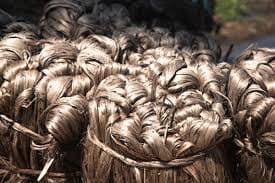The price of raw jute has mostly been ruling over the Minimum Support Price, therefore, price of jute and demand by the jute mills may not be a factor in the decline in cultivated area of jute. The slight decline in the cultivation area has been compensated by the increased productivity with the use of modern agronomic practices introduced by Government. Also, Jute Corporation of India has been mandated to purchase raw jute from the farmers at Minimum Support Price (MSP) whenever the price of raw jute goes below the MSP.
MSP for raw jute is fixed by Government every year to protect the interest of the jute farmers. The MSP of raw jute in year 2012-13 was Rs. 2200 per quintal which has now increased to Rs. 4225 in year 2020-21. The opening and closing of jute mills is a cyclical process which depends on various factors of production such as productivity, trade unionism, raw material supply etc. The jute mills are in private control. The Government is however ensuring that there is sufficient demand of jute bags by mandating 100% reservation for packaging of foodgrains in jute bags thereby creating a conducive environment for opening up of new jute mills in the country.
Several jute manufacturing units including one composite jute mill have come up in different parts of the country as a result of the conducive environment being provided by the Government. With the provision of 100% mandatory packaging of foodgrains in jute bags, there is no dearth in the demand of jute bags. In fact, the demand of jute bags is more than the capacity of jute mills due to which the Government has to resort to dilution in the provision of 100% mandatory reservation of jute bags for packaging of foodgrains.
To modernise the jute mills, the Government is already implementing the Incentive Scheme for Acquisition of Plant & Machinery (ISAPM). Under the scheme, efforts are being made to increase the productivity of the jute mills by providing capital subsidy to replace the old machines with new and technologically advanced machines. During 2014-15 to 2018-19, capital subsidy amounting to Rs. 49.71 crores has been released to modernise jute mills and JDP units.

